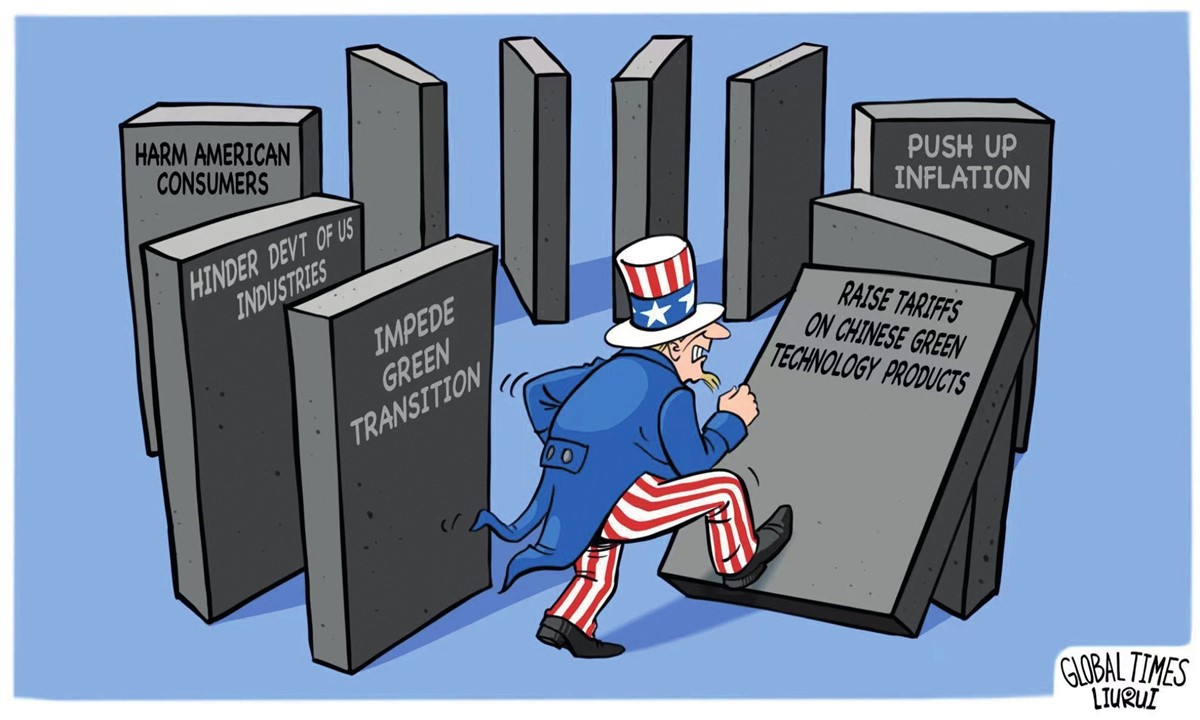US should embrace competition, not contain China, in electric vehicle development

Illustration: Liu Rui/GT
The US has made the decision to apply 100 percent tariffs to electric vehicles (EVs) coming from China. The question is, why now? The other question is, what are the implications going forward for China and the US?
The issue about EVs is at the forefront in the US political circle, as it is now widely recognized that China has become the dominant EV producer globally. In order to protect the US auto industry, tariffs have been put in place. However, in the long term, this strategy is not going to be effective, as those in the political world often fail to consider long-term consequences.
If you read the press over time, the US has basically taken the position that China is subsidizing many industries, especially the EV industry, allowing China to sell products at lower prices . That's not the reality of what has happened in China. What has happened in China is the same model that has occurred in major corporations around the world. They look at the future, consider where the opportunities are, and assess their relative strategic position to invest in R&D, talent and partnerships to bring their vision to fruition. That's exactly what China has done.
The Chinese EV industry is growing very rapidly and becoming self-sufficient. Therefore, the US first and foremost needs to swallow its pride and learn from what the Chinese have done, which may not be easy.
China is in an ideal strategic position to offer the best product at the best price globally. China has already started to reach technology agreements with some countries that give them access to EV technology at a cost. The rest of the world is recognizing that China has a significant head start in this area, and frankly, it's much better to work with China in EVs rather than attempting to compete against it from scratch.
China has enormous opportunities going forward. For those countries that want to protect their auto industry jobs, China could clearly, as other companies have done, set up manufacturing facilities locally to ensure local employment. China has more than enough opportunities and a great deal of momentum in terms of the technological advantages, and China is rapidly building the brand recognition.
Then, where does the US go from here? The core challenge the US faces is that it has adopted a containment strategy toward China to both block China's access to the US' high-end technology and slow China down. The problem is, it's very difficult to both contain and compete, because it's a very different mindset. So, what the US needs to do is to recognize that containment is not going to be possible. What the US has to do, first and foremost, is change its mindset, and my suggestion is that it should compete, not contain.
Overall, putting tariffs and preventing US consumers from gaining access to Chinese EVs is not going to do anything for a competitive position. The long-term impact is going to be determined by who sets out to play in the EV world and makes investments in talent, innovation and partnerships that are required to be successful.
The author is a speaker on China-US relations and author of the book Powerful, Different, Equal: Overcoming the misconceptions and differences between China and the US. opinion@globaltimes.com.cn

